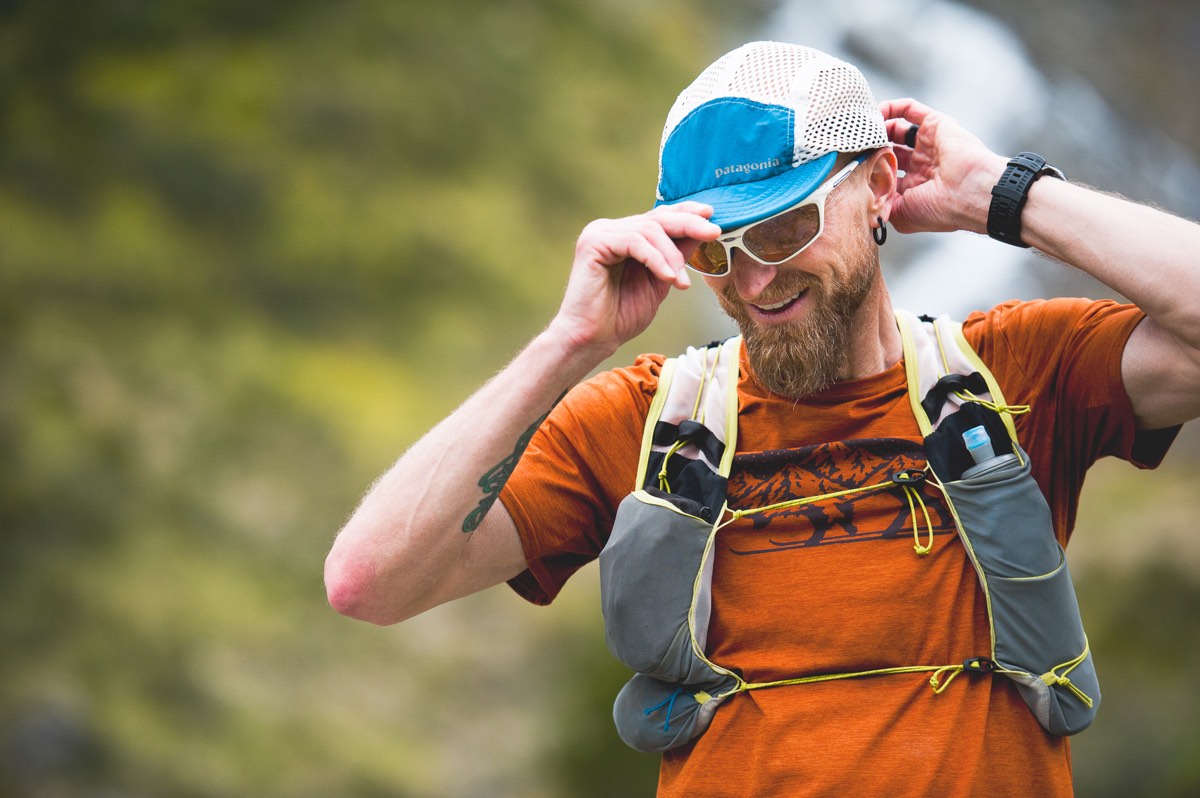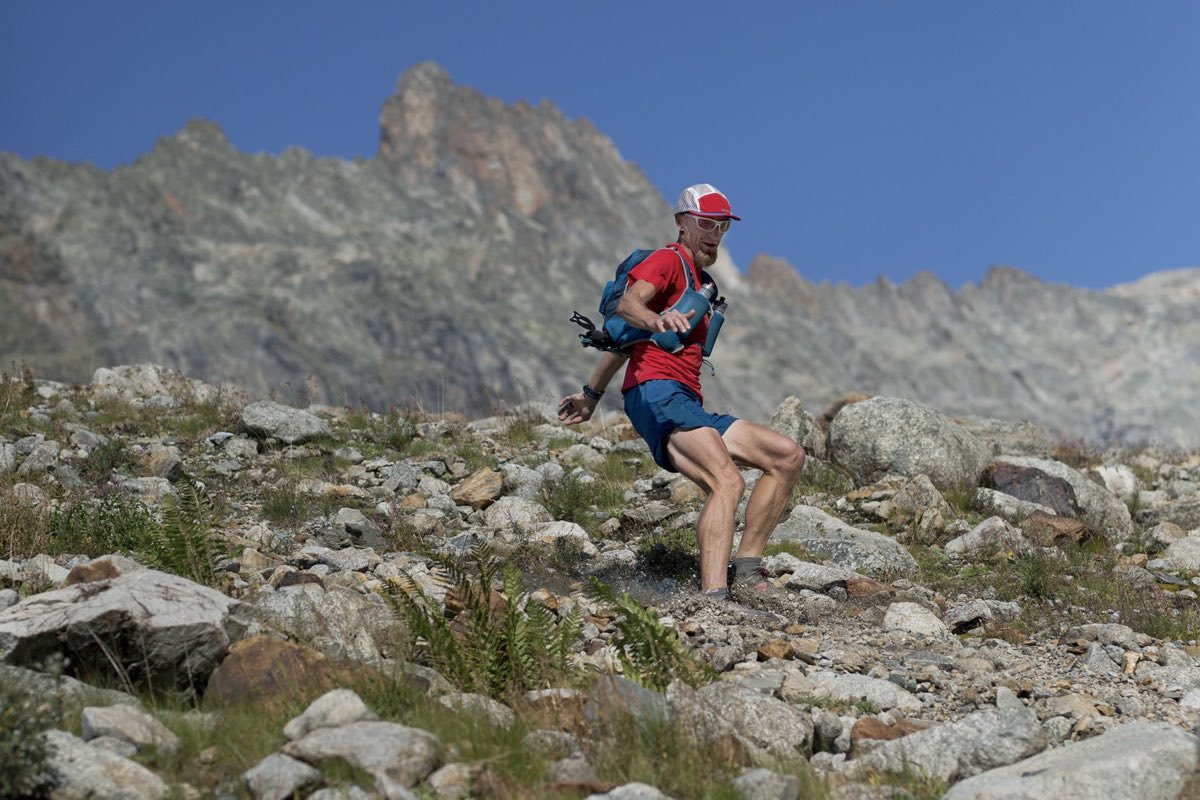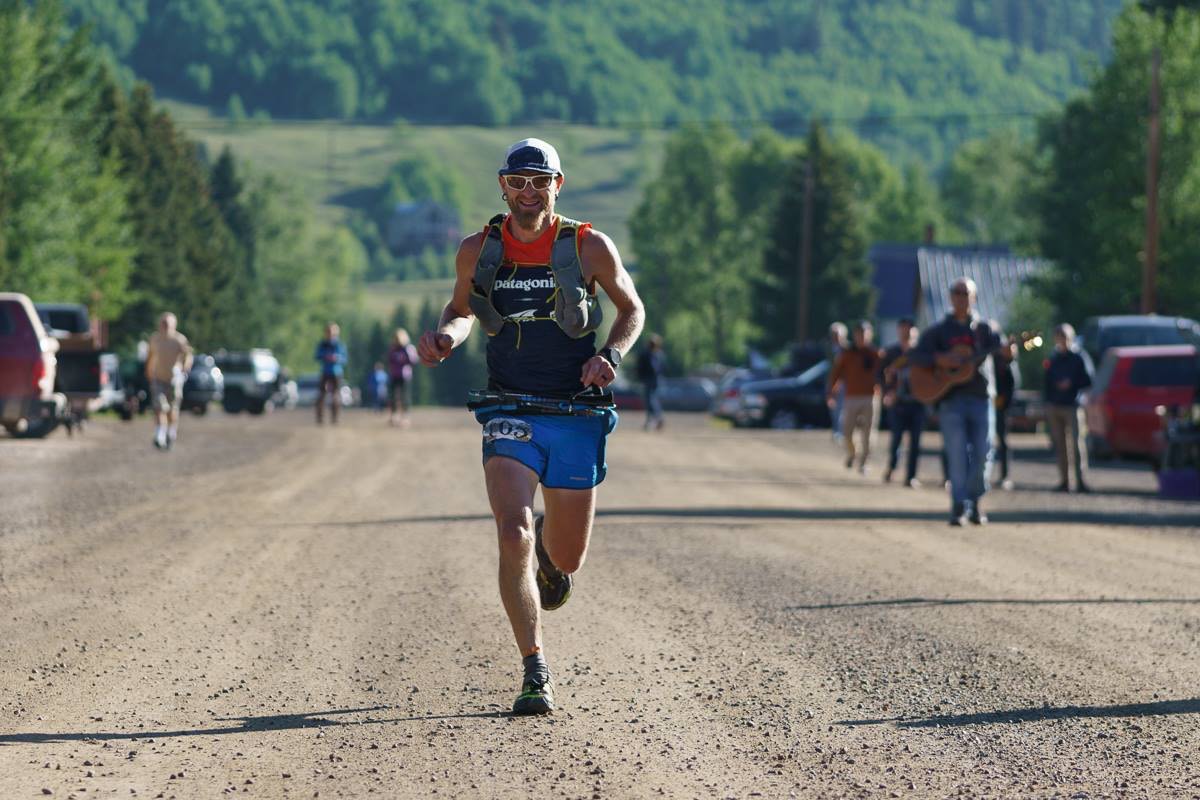‘Age-Old Runners’ is an article series where we explore runners’ performance potential after the age of 45 by interviewing excellent middle-aged runners. Is there still potential to improve? What roles do motivation, mindset, and specific training and recovery techniques play in allowing runners in their mid-40s to mid-60s to continue to excel? To learn more about this series’ goals, check out its introductory article.
Jeff Browning is 48 years old. He’s been running ultramarathons since he was 28. He has 31 career ultra wins. Twenty two of those wins are 100 milers. Since turning 45, he has won 13 ultras including seven 100-mile races. He’s been top five at every race he’s run since turning 45 except two.
The following is a transcript of a phone interview with Jeff. It has been edited for brevity and clarity.
You’re 48. How do you see your potential as a runner?
I feel like there’s still some there. I don’t know necessarily about PRing in specific events all the time, but I think there’s still a chance. I’m still dabbling in course records occasionally in 100 milers. And I’m probably not quite as fast as I used to be in shorter stuff, but I do feel like there’s still potential in the long stuff. I just feel really strong. I don’t feel like I’ve slowed down yet.
On the value of experience on performance
How long you’ve been in the sport is a factor. In the early days, it was: “Woah, these things are hard,” and then trying to figure them out. I mean, there are still things to figure out and you make mistakes sometimes. But more often than not, I run them pretty consistently and I know what to do. And there’s a comfort in that.
I’ll definitely keep running 100 milers. I like hundreds. I feel like you don’t have to be crazy fast to be competitive at them. You just have to be smart. And you have to have good leg speed in some of the bigger ones. You definitely have to have the eye of the tiger in something like the Western States 100 or the Run Rabbit Run 100 Mile.
How will your running change when you’re not able to podium anymore?
I’ll focus on adventure running. So longer stuff, even longer than hundreds. Two-hundred milers or adventurous multi-day stuff… where the goal is more to link up cool routes and tell a story about it. That’s where I see my fifties.
But right now, into my early fifties, I still feel like I have three to five seasons in me. Every three seasons, I say, “I think I have three more seasons.” And I keep saying three more seasons, and now I’m almost 50.
Do you have an age in your head when you expect to slow significantly?
If you look at the history of our sport, we’ve seen a few guys run really well into their early 50s. It seems like once you hit 52 or 53, you don’t really hear about them anymore. I think I still have into my early 50s to race hard. And that’s my plan. I have my sights set on some 50-plus records. The other thing is, just for me, I’ve got a lot of motivation in hundreds because I’m getting up there in historical number of wins. As far as I can research, I think I’m third. Ann Trason is second. She has 22 100-mile wins, and I have 20. Karl Meltzer has 41; he’s out of reach.
Does anything distress you about the aging process?
Well, I do think about coming to terms with: “Woah! I’m not going to win anymore.” Because winning is really fun. It’s kind of addictive; it’s like a drug. With so many career wins in ultras–I think I’m 28 or 29 total, and 20 hundreds. I’m approaching 30 career wins. That’s a big number, and that’s a lot of wins to have under your belt over the years…. I can’t remember the last year I didn’t win something. So that’s a thing I’ll have to come to terms with, for sure. And I don’t know how I’ll come to terms with it. I think I’ll be okay. Hopefully, I do it gracefully.
What physical changes have you noticed as a runner?
I’m wrinkly, especially around my knees. And my hands look different a little bit. I’m starting to see that. When I take my glasses off and I look at myself in the mirror without my glasses, I have some serious serious lines.
Does that bother you?
It doesn’t really.
How do you feel when runners comment on your age?
Now that I’m almost 50, people are really starting to go, “Woah!” It’s starting to show. If you look at me really closely, you can tell I’m 48 because I’ve got the wrinkles. But from a distance, or in passing… I’m not super white in my beard yet. I have speckles in it. I have earrings, tattoos…. I usually shock a lot of people when I say how old I am. I kind of like being that example. I mean personally, I take pride in it. Not in a weird egotistical way, but more in a… I want to inspire. That’s why I’m willing to work hard and keep competing, to show people that age is just a number. It doesn’t have to be what defines you. And there are so many people who accept that, “I’m just too old for this.” But it’s, “Well, no, you’ve let yourself go.” You have to work extra hard to maintain. You have to do a few extra things. And they can be fun. They don’t have to be a chore. But if you prioritize them in your life, you will have good longevity in the sport.
You have an eight year old. How does that impact your perception of your age or how you’re aging?
Yeah, I think that helps. I find myself wanting to sit around and read and drink tea. I find I’m not as motivated as I was when I was 30-something to get out with my kids. I have to check myself in that respect because I will sometimes find myself quick to say no to things. And he has siblings who fill in that gap. But I still need to remember that I need to do it too. So I definitely remind myself to not be the old man all the time.
How long have you been training at your current volume and intensity? What is your ‘running age?’
In ultrarunning that would be 19 seasons. This is my 19th season this year. So 19 years of doing it consistently. The first three or four years, I had some on-and-off injuries. But from 2005 on, I have rarely gotten injured. [Author’s Note: Jeff also ran track in high school, and while that volume and intensity wasn’t as great as what he does now, maybe his running age should be closer to 23 years.]
Looking back, would you change anything about how you trained?
I would have embraced strength and mobility earlier. And I would have changed my diet had I known what I know today.
On strength and mobility training
I strength train. I try to keep myself very strong. When you look at people who strength train regularly… not just do a little functional stuff here and there, but really, actively are in a gym a couple of days a week… If you do it when you’re older, and you’ve done it for a long time in your twenties, thirties, and forties, and you keep doing that as a lifestyle habit, I feel like you will stay really mobile. You’ll stay really strong through a full range of motion. And if I see athletes who are still running fast at 58, 59, 60, they do strength. You don’t see any runners in their late fifties who are fast and who do not have a strength routine.
For example, I was just at a 12-kilometer trail race, and there was a guy who was in fifth, who was 58, and he is still fast. There was 2,000 feet of climbing, and he bombed down, and he really had mobility. We had a chat afterward and he does strength training. Of course he does! He looks like he does. He has good muscle tone still. You see a lot of men and women, just pure runners, they get really lean and no muscle. They lose their muscle mass. It really shows in your mid-to-late fifties.
If you don’t do something to replace it, you’re losing it. And I think those who understand that prioritize strength training. They have to be a priority versus a luxury. When you’re younger, you’re like, “I’m going to run. I’ll blow off the strength training.” Whereas now, I’ll cut my runs short to get my strength training in.
For example, this week I had a 50-minute class I went to which is functional fitness for 50 minutes, and you’re ‘on’ the whole time. So band work, single-leg stuff, balance work, it’s full-body. And I do a full-body Tough 21 Workout that UltraRunning Magazine filmed.
On diet
It’s a combination of multiple diets. I use them strategically. So kind of paleo 80% of the time. Just avoiding grains and sugar in my everyday diet as a general rule. And then I use keto, less than 50 grams of carbohydrates a day. I use that as a tool here and there. Initially, to get adapted early on for a longer phase, and then I back off and use it as a strategic phase here and there, so I can manage weight or get into race weight or after the holidays when I eat too much and put on a couple of pounds.
Basically, it’s kind of “Optimized Fat Metabolism.” That’s kind of the protocol, strategic carbohydrate use. That’s how I use carbohydrates, strategically around effort and volume. That gives me all the pop and the recovery benefit. I’m keeping my insulin really stable all the time.
I tell athletes who I coach who do this to get ready for the recovery. The recovery will blow your mind. I can say that with confidence. It does not disappoint if people are willing to go through all the steps that it takes to learn it and are patient with the process.
That’s probably my biggest aha moment in my adult years–the nutritional shift. It was truly a game changer for recovery, inflammation, weight management, all those things.
Now, sugar is totally appropriate on race day and long runs. It’s on! Whatever works. But the rest of the time, if you can, minimize grains and sugar because they’re inflammatory and they knock your immune system down.
[Author’s Note: To hear more about Jeff’s diet, you can listen to this podcast with and Dr. Shawn Baker and Zach Bitter.]
Has your motivation to train and race hard changed since you started running?
No. I still feel motivated to train hard. And I still feel motivated to improve and work. I’m still motivated to do speedwork. I’m still motivated to run hard and do big days in the mountains.
You’re still just as willing to hurt and suffer?
I am. And I feel like I’m making even more friends with the suffering. You know, I just feel like I’m tougher mentally, and I know I can ‘go there’ because I’ve gone there. There’s so many times that I’ve gone there now that I just go, “Okay.”
On motivation and consistency
If you have motivation, you’ll get the work done, and you’ll do what it takes to get everything in. And if you don’t, then you’re not going to be competing still, I don’t think. I haven’t seen it. I’ve been in the sport for almost 20 years, and I just see a lot of guys start to fade out in their forties because they don’t do the little stuff. They’re just runners. If you have a major setback in your late forties, and you can’t run for a year or very little for a year, you’re going to age quick. Right? So the consistency is really really key. I’d rather have less mileage, less volume–even cross train a little bit to make up for some of that volume and make sure you can train consistently–than chase numbers.
On mindset
I think there’s a mindset piece to this. I look at myself and I’m like, “No I’m not aging. I can still do this.” I tell myself I can still do it. I’m not going around going saying, “It sucks getting old.” I’m not saying that. I’m not going to build that neural pathway.
What does your recovery after a 100-mile race look like?
I usually don’t run for five to 10 days depending on what I feel like. I go by feel. I usually walk and might spin on my bike the first week. Then the second week, I start jogging again and cross train a little bit. Then after two weeks, I’m usually back to running regularly. This time, after the Bear 100 Mile, I bounced back really quickly. I actually jumped in a 12k fifteen days after the race, and I ran really well and fast. My legs felt really good.
So it just depends. Sometimes I bounce back fast, and sometimes I’m a little beat up. I just try to listen to the body and go by feel that first three weeks unless I have something on the schedule back-to-back. Like next year I have the Western States and Hardrock 100 double again, 19 days apart. That’ll be the third time I’ve done the double. I’m very focused in between those two with recovery.
Training specifics
- Weekly running volume: Fifty to 80 miles peaking at 90 to 100 miles; 8000 to 15,000 feet vertical gain
- Strength training: Two to 3 times/week
- Off-season: Four to 8 weeks running only 3 days/week and cross training 3 days/week
- Sleep: Seven-and-a-half to 8 hours/night
- Race nutrition: GU Energy Drink Mix and Gels; Vespa; H.V.M.N. Ketone Ester
- Recovery: Varies; Goes by feel
Three factors Jeff attributes his running performance to
- Strength and mobility training
- Diet
- Consistency



